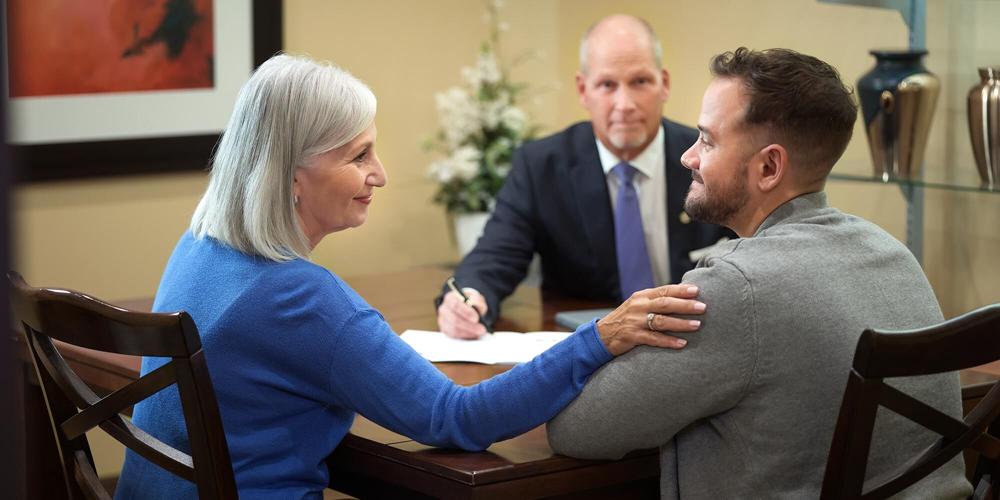Most Canadians deeply value the concept of planning for the future. In fact, 94 per cent agree it’s important to share their end-of-life wishes with loved ones. Yet fewer than half have actually done so.
Arbor Memorial Inc.’s 2025 Legacy Council Survey1 highlights this striking disconnect between what Canadians believe and what they do. While strong agreement around the importance of communicating one’s wishes has grown (66 per cent now strongly agree, up from 57 per cent in 2023), the number of people who’ve made or shared a plan has dipped slightly — from 50 per cent to 47 per cent.
This underscores the fact that while people mean well, these crucial conversations and clear legacy planning frequently get postponed.
Why ²¹°ù±ð²Ô’t we having these conversations?

Talking about final wishes can feel emotionally strenuous. People often want to avoid upsetting their families or simply don’t feel confident about how to begin their legacy planning. Some assume there’s plenty of time, while others fear it’s simply too overwhelming.
But the fact remains that sharing your wishes with family and friends is a profound act of kindness. During the emotional period following a loved one’s passing, families are often left to navigate a mountain of important decisions — sometimes without knowing what the person would have wanted. By sharing your preferences ahead of time, you can help ease their emotional and logistical burden, and ensure your wishes are honoured in a way that feels right to you.
When we don’t share, loved ones are left guessing
From deciding on the type of service to managing financial responsibilities, there are dozens of decisions to make in the days after someone passes. Arbor’s earlier research found that there are at least that families may face.
Why is legacy planning important? Without a clear plan, loved ones can be left wondering: Would they have wanted a traditional service? Cremation or burial? Who should speak? Where should it take place?
These are deeply personal choices — and, when left unspoken, they can become sources of confusion or even conflict. Sharing your wishes in advance provides clarity, comfort, and direction.
Who knows your wishes?
Among Canadians who have shared their plans, a spouse or partner is the most likely person to be informed (63 per cent), followed by children (40 per cent) and siblings (23 per cent).
This is encouraging — but it still means many friends and families are left out of the loop. Even among those who’ve made arrangements, important details can remain unspoken or unclear.
End-of-life planning isn’t a one-off task. It’s an ongoing conversation — one that can bring loved ones closer, provide peace of mind, and ensure everyone feels confident in the choices made.
Closing the gap: how to take the first step

If you haven’t yet shared your wishes, you’re not alone. Here are some simple ways to begin:
1. Start gently
Frame the conversation as a demonstration of care for your family, not something to fear or avoid. Choose a calm, comfortable moment to begin.
2. Think about who should know
Your partner, children, siblings, or close friends may all play a role in carrying out your wishes. Consider who needs to be part of the conversation.
3. Put it in writing
Talking is important — but writing things down ensures nothing gets lost. Keep your plans in a safe, accessible place, and let others know where to find them. Many final wishes shouldn’t be included in your Will — like funeral or memorial service details and burial or cremation preferences. Because Wills are often read after funeral arrangements have been made, it can be easier on your loved ones if best wishes are communicated separately immediately after your passing.
4. Revisit your wishes over time
As life changes, your preferences may shift too. Make reviewing your plans a natural part of major life events like retirement, moving, or welcoming a new family member.
5. Use trusted legacy planning services tools
Arbor Memorial’s free Estate Planning Kit includes a legal will guide, power of attorney information, and a family registry to help you get started. You can request your copy .
A legacy of love and clarity
Legacy planning ahead may not be easy, but it is powerful. It means that when the time comes, your loved ones can focus on celebrating your life, rather than worrying about what to do next.
By turning intention into action, you leave a legacy of thoughtfulness, compassion, and care. And that may be the greatest gift of all.
Join Arbor Memorial’s Free Webinar
By planning your end-of-life decisions now, you’re giving your loved ones one less thing to worry about later. Learn more at our upcoming webinar.
1Â Arbor Memorial Legacy Council Survey Results. Leger Services. April 2025.




























